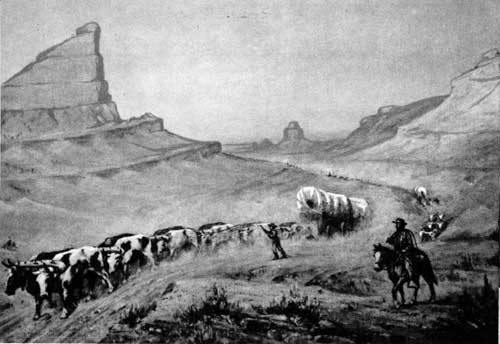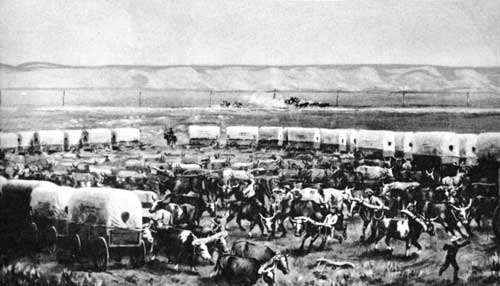|
SCOTTS BLUFF National Monument |
 |

William H. Jackson painting of bull train in
Mitchell Pass based on original sketch of 1866.
Scotts Bluff—The Artistic Record
The last noteworthy Oregon Trail journalist was a young "bull-whacker" of 1866 named William H. Jackson, who was destined to become the "living link" between Scotts Bluff National Monument and its historic past. When he came to Mitchell Pass he found the going tough. He reports that "we had one of the steepest and worst gulches to drive through that we have yet had." His outfit camped just west of the pass. Finding no spring in the vicinity, someone had to go 3 miles to the river for water. Young Jackson, a man of notable artistic talent, stopped to sketch the pass. Today, nearly a century later, his original sketch of Mitchell Pass, together with dozens of his other original Oregon Trail sketches and paintings, hang in the William H. Jackson Room of the Oregon Trail Museum.

"Yoking Up."
From original sketch by William H. Jackson
William H. Jackson achieved fame as the "Pioneer Photographer" of the Rocky Mountain West, being the first to make a photographic record of Yellowstone geysers, the Teton Mountains, and many other scenic wonders now preserved in National Parks. In 1936, at the age of 93, he accepted an invitation to make the dedication speech for the history wing of the new museum-administration building. In 1938 on a visit here he staked out his 1866 campsite, which is now identified by a trailside marker. After his death in 1943 the American Pioneer Trails Association donated many of Jackson's original sketches and later watercolors to the National Park Service, while Julius F. Stone donated $10,000 as the nucleus of a fund to build a Jackson Memorial Room. The building fund was supplemented by public contributions and the completed wing was dedicated in 1949.
The A. J. Miller sketch of 1837 and the Jackson sketch of 1866, the earliest and the latest known pictures of Scotts Bluff made during Oregon Trail days, are the best known today. The Piercy sketch of 1853, above noted, has been rather widely reprinted. Other authentic contemporary drawings are found only in obscure or rare out-of-print guidebooks or journals. Noteworthy among these are those of David Leeper in 1849, Benjamin Ferris in 1854, Cornelius Conway in 1857, T. S. Kenderdine in 1858, Richard Burton in 1860, and Alfred Lambourne, date uncertain.

|

|
|
Last Modified: Sat, Dec 9 2000 10:00:00 am PDT |


